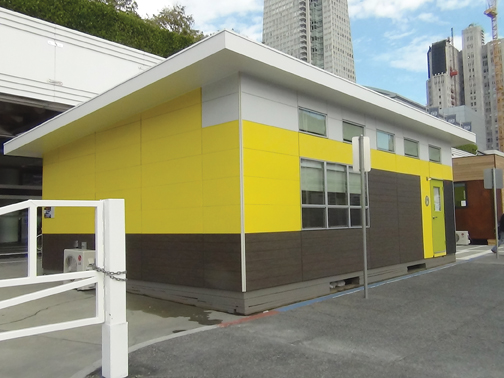At Greenbuild 2012, Building Design+Construction sponsored the fabrication of a modular, energy-efficient classroom, which was displayed outside the North Hall of the Moscone Center in San Francisco. BD+C talked to several people as they left the SAGE classroom to see what they thought and what caught their eye. Here’s what they had to say:
 Joy Bennett, Market Development Manager, Ashland Inc. (right) – “I think there were a lot of interesting products featured. There seemed to be a fair amount of space. I’m guessing it goes up pretty fast, which is a huge benefit, and that with all the windows and lighting that it’s a much better temporary solution than many of the things that have been used in the past.”
Joy Bennett, Market Development Manager, Ashland Inc. (right) – “I think there were a lot of interesting products featured. There seemed to be a fair amount of space. I’m guessing it goes up pretty fast, which is a huge benefit, and that with all the windows and lighting that it’s a much better temporary solution than many of the things that have been used in the past.”
Anthony Garrison, Installed Business Consultant, Ashland Inc. (left) – “I could see it being used in a place like Haiti where they want to bring normalcy back to the children. Obviously you want to put them back in a situation where they’re more familiar. Something like this could be shipped in and would go up pretty quick. The insulation was pretty amazing; I’ve never seen anything like that. It’s nothing like the classrooms I was used to.”
 Amelia Feichtner, Principal, Cuningham Group Architecture Inc. – “One of the major takeaways for me was the amount of natural daylight they got into the space, and not just with the windows but also the controllability of them. What we face a lot is that we get all this natural daylight in, but if you need a blackout situation to do presentations or something, it gets difficult. So that was definitely something that left an impression. Overall, as someone who’s looked into this for a while, it was a really beautiful space.”
Amelia Feichtner, Principal, Cuningham Group Architecture Inc. – “One of the major takeaways for me was the amount of natural daylight they got into the space, and not just with the windows but also the controllability of them. What we face a lot is that we get all this natural daylight in, but if you need a blackout situation to do presentations or something, it gets difficult. So that was definitely something that left an impression. Overall, as someone who’s looked into this for a while, it was a really beautiful space.”
 Francis Gichuhi, Habitech Consultants, Nairobi, Kenya – “This project offered a lot of interesting insights that I will consider for a similar project that I will be working on in Kenya. I hope this will lead to more contacts and greater information on the subject.”
Francis Gichuhi, Habitech Consultants, Nairobi, Kenya – “This project offered a lot of interesting insights that I will consider for a similar project that I will be working on in Kenya. I hope this will lead to more contacts and greater information on the subject.”
 Annie Argento, Assoc. Principal, Gaia Development – “The modular classroom is very inviting and just the kind of space one wants for a child to learn and grow. The natural daylight penetration, healthy and vibrant materials, and the obvious adaptability are all best practices for healthy schools, and it’s wonderful to see these principles and strategies come to fruition in a structure like this.” +
Annie Argento, Assoc. Principal, Gaia Development – “The modular classroom is very inviting and just the kind of space one wants for a child to learn and grow. The natural daylight penetration, healthy and vibrant materials, and the obvious adaptability are all best practices for healthy schools, and it’s wonderful to see these principles and strategies come to fruition in a structure like this.” +
Related Stories
Building Technology | Jun 18, 2024
Could ‘smart’ building facades heat and cool buildings?
A promising research project looks at the possibilities for thermoelectric systems to thermally condition buildings, writes Mahsa Farid Mohajer, Sustainable Building Analyst with Stantec.
University Buildings | Jun 18, 2024
UC Riverside’s new School of Medicine building supports team-based learning, showcases passive design strategies
The University of California, Riverside, School of Medicine has opened the 94,576-sf, five-floor Education Building II (EDII). Created by the design-build team of CO Architects and Hensel Phelps, the medical school’s new home supports team-based student learning, offers social spaces, and provides departmental offices for faculty and staff.
Healthcare Facilities | Jun 18, 2024
A healthcare simulation technology consultant can save time, money, and headaches
As the demand for skilled healthcare professionals continues to rise, healthcare simulation is playing an increasingly vital role in the skill development, compliance, and continuing education of the clinical workforce.
Mass Timber | Jun 17, 2024
British Columbia hospital features mass timber community hall
The Cowichan District Hospital Replacement Project in Duncan, British Columbia, features an expansive community hall featuring mass timber construction. The hall, designed to promote social interaction and connection to give patients, families, and staff a warm and welcoming environment, connects a Diagnostic and Treatment (“D&T”) Block and Inpatient Tower.
Concrete Technology | Jun 17, 2024
MIT researchers are working on a way to use concrete as an electric battery
Researchers at MIT have developed a concrete mixture that can store electrical energy. The researchers say the mixture of water, cement, and carbon black could be used for building foundations and street paving.
Codes and Standards | Jun 17, 2024
Federal government releases national definition of a zero emissions building
The U.S. Department of Energy has released a new national definition of a zero emissions building. The definition is intended to provide industry guidance to support new and existing commercial and residential buildings to move towards zero emissions across the entire building sector, DOE says.
Multifamily Housing | Jun 14, 2024
AEC inspections are the key to financially viable office to residential adaptive reuse projects
About a year ago our industry was abuzz with an idea that seemed like a one-shot miracle cure for both the shockingly high rate of office vacancies and the worsening housing shortage. The seemingly simple idea of converting empty office buildings to multifamily residential seemed like an easy and elegant solution. However, in the intervening months we’ve seen only a handful of these conversions, despite near universal enthusiasm for the concept.
Healthcare Facilities | Jun 13, 2024
Top 10 trends in the hospital facilities market
BD+C evaluated more than a dozen of the nation's most prominent hospital construction projects to identify trends that are driving hospital design and construction in the $67 billion healthcare sector. Here’s what we found.
Adaptive Reuse | Jun 13, 2024
4 ways to transform old buildings into modern assets
As cities grow, their office inventories remain largely stagnant. Yet despite changes to the market—including the impact of hybrid work—opportunities still exist. Enter: “Midlife Metamorphosis.”
Affordable Housing | Jun 12, 2024
Studio Libeskind designs 190 affordable housing apartments for seniors
In Brooklyn, New York, the recently opened Atrium at Sumner offers 132,418 sf of affordable housing for seniors. The $132 million project includes 190 apartments—132 of them available to senior households earning below or at 50% of the area median income and 57 units available to formerly homeless seniors.

















